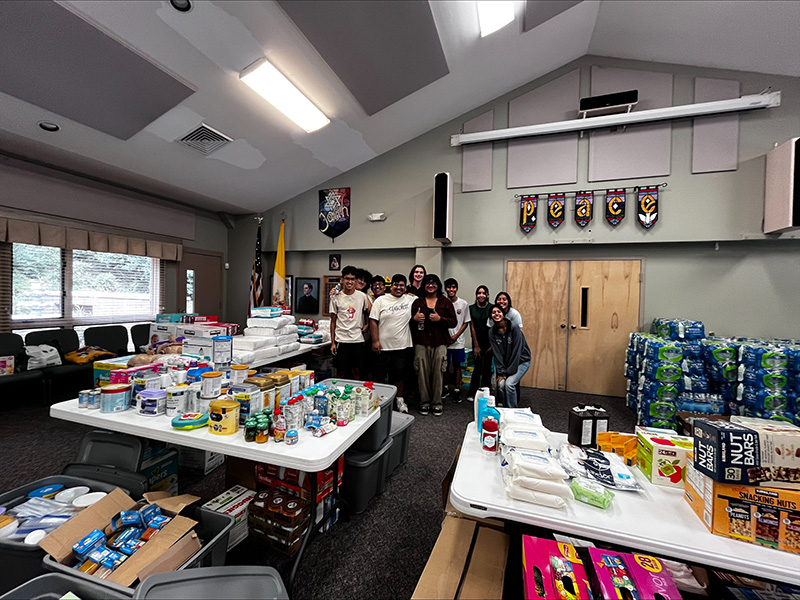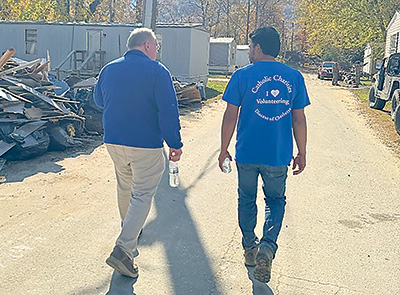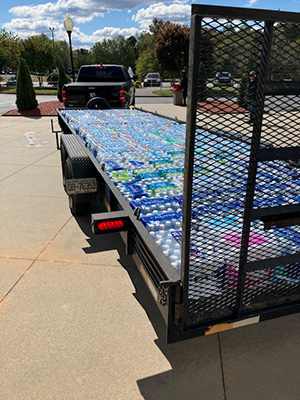 CHARLOTTE — A new refrigerator. A roof repaired. Running water and electricity.
CHARLOTTE — A new refrigerator. A roof repaired. Running water and electricity.
Those are just a few of the needs the Diocese of Charlotte has begun to help people address as it shifts its relief efforts toward rebuilding their lives after Tropical Storm Helene. The storm ravaged western North Carolina Sept. 27, triggering historic floods and mudslides that destroyed communities and killed at least 99 people, with more unaccounted for.
The workload is immense, so the diocese’s Catholic Charities social services agency has added three caseworkers to its existing team of four in the western region that covers Asheville, Lenoir and North Wilkesboro. They are surveying storm-damaged areas in 37 of the diocese’s 46 counties, including in a 30-family trailer park in Transylvania County that was heavily damaged.
With 20 staff focusing some or all of their efforts on Helene relief, Catholic Charities has connected with nearly 400 people to provide assistance – with more expected to come.
“Most people don’t have the resources to replace all the things they lost,” said Gerry Carter, the agency’s executive director and CEO. “For instance, in some of these trailer parks, you see trailers that have been ripped down to the very walls. There are children playing outside trailers that are empty because everything they had is gone. This is a long-term process of recovery. For many of these families, every single thing they had is gone.”
Donations fuel rebuilding
Fueling Catholic Charities’ work is $6.3 million received in donations since the storm – including $1 million from Catholic Charities USA and contributions from donors in all 50 states and six other countries.
The agency plans to budget spending out over the next 24 months to help meet short- and long-term needs of those hit hardest by the storm. The new caseworkers – including three whose own homes were heavily damaged in the storm – are helping people apply for and troubleshoot access to FEMA and other government resources. They also are evaluating people’s needs for food and water, shelter, improved safety, employment, childcare, medical assistance and special personal needs.
“We want to provide the direct assistance to help people rebuild their lives,” said Jesse Boeckermann, Catholic Charities’ Western Region director, “whether that’s a new refrigerator, bed or couch that was destroyed, repairs to homes and cars that had trees fall on them, rental and utility assistance…and transitional housing costs for people that can’t live in their home because of flood and storm damage.”
Caseworkers are going neighborhood by neighborhood in affected areas, as well as receiving referrals from parishes, community groups and other organizations. Many people are requesting help through the agency’s website.
Catholic Charities is also partnering with health care providers who become aware of human service needs of patients seeking medical care. The agency is also connecting people with other aid organizations and helping them file claims with FEMA and their insurance providers.
One family the agency is helping includes a father, a mother who is eight months pregnant, and their four children. The family lost everything, Carter said, when floodwaters rushed through their trailer, and they are currently sharing a single bedroom in a friend’s house.
The agency is trying to get their trailer repaired or find them new housing.
Small steps of impact
 Progress is being measured in small steps. Power has been almost fully restored across the region. Internet and cell phone coverage are coming back little by little. Schools and businesses are reopening where possible. The water is flushable in many areas, but “boil water” advisories continue. While some of the most obvious storm damage has been cleaned up, infrastructure needs remain: Asheville’s water system and many roads and bridges need to be rebuilt.
Progress is being measured in small steps. Power has been almost fully restored across the region. Internet and cell phone coverage are coming back little by little. Schools and businesses are reopening where possible. The water is flushable in many areas, but “boil water” advisories continue. While some of the most obvious storm damage has been cleaned up, infrastructure needs remain: Asheville’s water system and many roads and bridges need to be rebuilt.
“This won’t be disaster relief that lasts weeks and months,” Boeckermann said. “It will last for years as people rebuild their lives.”
While the agency is no longer focused on delivering emergency supplies as it was in the initial aftermath of the storm, it is still getting donated supplies and working to get them where they are most needed.
Carter said 10 to 12 bulk donations are planned and received each week, as well as several that are unannounced – with staff being notified of them while trucks are in transit.
“Staff members are doing a tremendous job redirecting some shipments and accepting others,” he said. “Our goal is to be the opposite of bureaucratic with lots of red tape – to make the process manageable while respecting the generosity of donors from across the country.”
Most important, Catholic Charities and diocesan leaders emphasize, is the need for financial donations to help families rebuild.
In the coming weeks and months, Carter said, Catholic Charities and the diocese will continue to accompany families in need – adding more caseworkers to help people navigate the long road of recovery.
“People will need to rebuild and recover,” said Boeckermann. “People died. People are still missing. People need to address the trauma of this storm in the months and years to come. In times of great need, it takes our whole diocese and community working together to bring hope and healing.”
More online
At www.catholicnewsherald.com: See more coverage of the impacts of Helene and recovery efforts underway.
How to help
 There has been an outpouring of assistance from people in the diocese, across the country and around the world. As of presstime, Catholic Charities and the Diocese of Charlotte received more than $6.3 million in donations, including $1 million from Catholic Charities USA. Continued assistance is needed as the relief focus has shifted toward long-term recovery assistance, being led by Catholic Charities. Caseworkers are visiting 13 mountain parishes to identify and evaluate the needs of those most affected by the storm. They will help people apply for and troubleshoot access to FEMA and other government and charitable resources. They also will evaluate people’s needs for food and water, shelter, improved safety, employment, childcare, medical and special personal needs – and will link clients to the services they need. Here’s how you can help those in need, or get assistance if you live in the affected areas:
There has been an outpouring of assistance from people in the diocese, across the country and around the world. As of presstime, Catholic Charities and the Diocese of Charlotte received more than $6.3 million in donations, including $1 million from Catholic Charities USA. Continued assistance is needed as the relief focus has shifted toward long-term recovery assistance, being led by Catholic Charities. Caseworkers are visiting 13 mountain parishes to identify and evaluate the needs of those most affected by the storm. They will help people apply for and troubleshoot access to FEMA and other government and charitable resources. They also will evaluate people’s needs for food and water, shelter, improved safety, employment, childcare, medical and special personal needs – and will link clients to the services they need. Here’s how you can help those in need, or get assistance if you live in the affected areas:
Donate money
Monetary donations are the fastest, most flexible and most effective way to support emergency relief efforts. Local responders on the ground can use the funds to help people with immediate as well as long-term needs. Give securely online: www.ccdoc.org/helenerelief.
Need help?
- Reach Catholic Charities via an online request form and/or local contact information at www.ccdoc.org.
- North Carolina 2-1-1: Use the state’s info hotline (call 211 and press 1, or go online to www.nc211.org) to find information about getting food, water and shelter; finding loved ones; checking current road conditions; filing damage and insurance claims; and other issues.
- FEMA assistance: Go to www.disasterassistance.gov, call 800-621-3362, or download and apply through the FEMA app.
Add your prayers
The diocese has an online prayer request form at www.charlottediocese.org/form-prayer-request.


